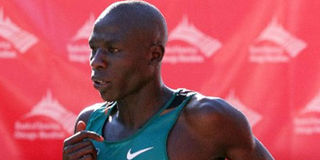No record for ‘Engine Kubwa’ yet

Moses Mosop during the Bank of America Chicago Marathon on October 9, 2011 in Chicago, Illinois. Photo/FILE
A strong headwind between the 20- and 30-kilometre marks, coupled with problems with his calf muscles, saw Kenya’s Moses Mosop’s chances of overhauling compatriot Patrick Makau’s world marathon record go up in smoke here on Sunday.
Ethiopians meanwhile threw down the pre-Olympic gauntlet by scooping the major medals at the 32nd ABN Amro Rotterdam Marathon.
Yemane Adhane and Getu Feleke broke off at the 25-kilometre mark and never looked back, taking gold and silver in two hours, four minutes and 48 seconds and 2:04.49, respectively, with “Engine Kubwa” Mosop taking the final podium place with a nonetheless impressive 2:05.02.
In the women’s race, Ethiopia’s Tiki Gelana ripped apart Kenyan Tegla Loroupe’s 14-year-old course record in this port city, of 2:20.47, which had stood since 1998 when it was then a world record, winning in 2:18.57.
Mosop was chasing Makau’s 2:03.38 clocked at the BMW Berlin Marathon last September and all seemed bang on target in the first half of the race when the lead pack cruised past the five-kilometre mark in 14:34, three seconds inside Makau’s Berlin pace.
The leaders – paced by Kenyans Richard Sigei, Jacob Cheshari, John Mwangangi, Geoffrey Kipsang and Jonathan Maiyo – continued to shred Makau’s pace through the 15-kilometre stage (43.41 compared to Makau’s 43.42) and were still dreaming at 20km (58:19 vis a vis Makau’s 58:30) and at the halfway mark, Kipsang led the group through in 1:01.37, seven seconds into Makau’s pace.
That’s when the plot was blown apart by strong northerly winds that swept them four seconds adrift of Makau’s pace at 30km (1:26.41) after the pacemakers dropped off, carrying their natural windbreaker with them.
Then it was left to the two Ethiopians to control the pace with Mosop trying to bridge the narrowing gap.
But the Kenyan ran out of kilometres, easing home in third, his 2:05.02 for a third marathon not bad at all after last year’s amazing Boston debut of 2:03.06 which he superbly followed up with victory in Chicago in October (2:05.37).
“I had problems with my calf muscles and after 25km, I could not move. I tried to push by my legs refused – that’s life,” said Mosop.
With Kenya’s Olympics selection also focusing on the Rotterdam race, Mosop’s Olympic dreams could well be over. But he’s not just giving up yet.
“I’m not giving up yet but it’s up to the selectors to make their call,” he said.
Calf injury did him in
Mosop’s coach, Italian Renato Canova, was following the race at the VIP lounge in Rotterdam’s World Trade Centre after which he said Mosop’s calf injury did him in.
“Perahps it was a result of running hard on tarmac, one hour each day, for the last three days during his training in Kenya,” Canova said.
The Ethiopian victors credited their performance to a change of training regine in Addis Ababa, something their Kenyan rivals ought to note with lots of caution.
“Last year, the top Ethiopian in the marathon was 21st in the world,” said the winner Adhane. “We had to sit down and see what went wrong, that’s when we changed our training programme and focused more on speed work.”
Gelana’s Brilliant 2:18.57 victory in the women’s race was an Ethiopian record, beating the previous mark of 2:19.31 clocked at January’s Dubai Marathon by Aselefesh Mergia who trained for a period in Iten.
“I knew I could run 2:19 and therefore I’m not surprised that I ran 2:18 today,” Gelana said.
Like Athletics Kenya, Ethiopia’s athletics federation will await the results of Sunday’s Virgin London Marathon and Monday’s Boston Marathon before naming their team to London.
Debutant Sammy Kitwara and another pre-race favourite, Peter Kirui, were hauled out with calf and thigh strains respectively just after the halfway mark.




